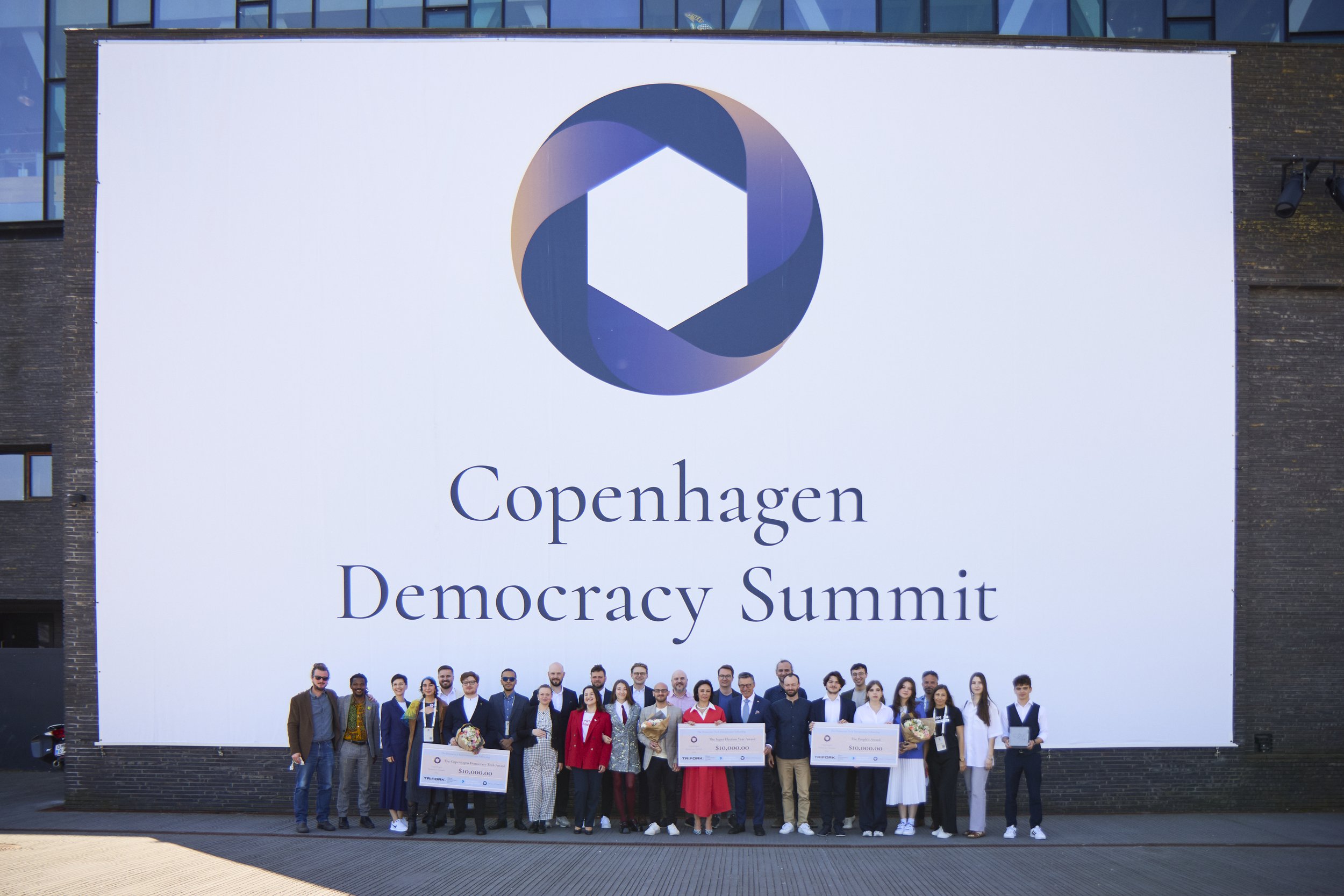The Need to Reimagine the Futures of Democracy
In 2024, I had the privilege of attending the Copenhagen Democracy Summit, an inspiring event that brought together experts, activists, and innovators committed to the present and futures of democracy.
This gathering, dedicated to exploring how we can strengthen democratic values and practices in an increasingly complex world, provided a platform for deep and meaningful discussions. The pre-release of the Democracy Perception Index 2024 by the Alliance of Democracies Foundation before the conference was a timely and valuable context for these conversations, bringing the perception of the people to the centre stage.
The people behind and in the Democracy Tech Entrepreneurship program. Photo by Alliance of Democracies Foundation.
How does people perceive democracy in 2024?
The Democracy Perception Index 2024 revealed a complex global sentiment towards democracy. While 85% of people affirmed the importance of democracy, only 58% expressed satisfaction with its current state in their countries. This dissatisfaction is felt even in countries with strong democratic traditions like the US and Europe.
Key concerns highlighted in the survey included economic inequality (68%), corruption (67%), and the influence of global corporations (60%). Opinions on social media's impact on democracy were divided, with many in Europe and North America viewing it negatively, while others globally saw its positive potential.
An interesting point raised during the summit was the apparent paradox of China ranking in the top ten for countries where democracy is seen as important and where it is perceived to be lived up to. This sparked discussions on cultural understandings of democracy, which may differ significantly from Western notions. It's a reminder that the concept of democracy can be highly relative and context-dependent.
Latana & Alliance of Democracies Foundation. Democracy Perception Index 2024.
The Democratizing Futures Lab
Before the main summit, we had the opportunity to host a Democratizing Futures Lab at the Demokrati Garage. This pre-conference workshop experience, a collaboration between ANTICIPATE and the Alliance of Democracies Foundation, brought together Democracy Tech Entrepreneur Fellows from frontline democracies in Ukraine, Georgia, and Moldova. Our goal was to equip them with futures thinking skills to tackle democratic challenges such as misinformation and climate change.
Democratising Futures Lab
During the two-hour session, participants engaged in a futures brainstorming exercise, exploring societal changes and identifying key issues and uncertainties. They developed innovative ideas and strategies to support democracy, creating tangible artifacts representing future democratic scenarios. The collaborative nature of the workshop fostered a network of future-oriented democratic thinkers, sharing perspectives and building on each other's insights. Read more about the Lab here.
Key takeaways from Day 1 at the Summit
Set in beautiful surroundings by Skuespilshuset (The Playhouse) in inner Copenhagen, the first day of the Copenhagen Democracy Summit focused on the broader state of democracy and strategies to support dissidents in autocracies and opposition groups in frontline democracies.
Youth Liberty Congress. Photo by Alliance of Democracies Foundation.
Here are five of my key takeaways:
Youth as change agents.
Empowering young people is crucial for the future of democracy. Presentations by the World Liberty Congress and Youth Liberty Congress representatives highlighted the importance of involving the next generation in democratic processes.
Resilience through tech
Tech solutions are vital for advancing democratic engagement and transparency. The pitches from Democracy Tech Entrepreneurs underscored this point, showing how technology can be leveraged to strengthen democratic institutions.
Facing existential risks
Our conversations with Ukrainians during the conference emphasized the immediate challenges faced by those in frontline democracies. For many, survival and resistance are the primary concerns, making the future an abstract concept. Yet, still relevant in the sense of rebuilding the country after the war.
The power of positive visions
Ursula von der Leyen’s message about creating positive visions for the future was inspiring and resonated deeply with how we look on what’s next. We need to build and share images of the futures we want to counter authoritarian and dystopian narratives.Global Attention Economy
Interestingly, the wide range of discussions showcased how big role the attention economy plays at a geopolitical level. Nations under authoritarian regimes often feel overlooked, stressing the need for consistent, focused global support to keep their issues in the international spotlight.
Ursula von der Leyen. Photo by Alliance of Democracies Foundation.
From problems to solutions
The second day of the summit shifted towards innovative solutions to secure the future of democracies. The presentations by the Democracy Tech Entrepreneur fellows were particularly inspiring, showcasing their passion and dedication to innovating for a better world.
Key discussions included the rise of deepfakes in politics, with Ursula von der Leyen emphasizing the need for 'prebunking' to enhance public awareness. Audrey Tang advocated for recognizing broadband as a human right, while Rasmus Bech noted that democracies had fewer excess deaths during COVID-19 due to higher trust in government. Leopoldo Lopez discussed cryptocurrency's potential to empower the unbanked and those under autocratic financial controls.
Shaping the Futures of Democracy
At ANTICIPATE, we believe in the power of strategic foresight and futures thinking to address democratic challenges. Our work focuses on three key areas:
Futures of Democracy. Exploring democracy at local, national, and geopolitical levels to rethink and strengthen our democratic systems.
Democratic Ownership. Promoting cooperative leadership and ownership models to meet evolving expectations for meaning, responsibility, and shared purpose.
Democratize Futures Thinking. Leveraging futures thinking to empower individuals and communities, ensuring everyone has a voice in shaping the future.
Conclusion
Reflecting on the Copenhagen Democracy Summit, it is clear that the future of democracy depends on our collective efforts to innovate, collaborate, and imagine new possibilities.We continuous engagement and proactive measures to strengthen democratic values but also to reenvisioning what we want it to be in the future.
What do you see as the most pressing issues related to democracy for the future?





